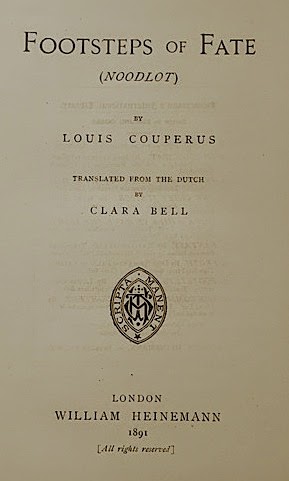An excellent introduction by Edmund Gosse to Louis Couperus's 1891 novel Footsteps of Fate ('Noodlot') translated from the Dutch by Clara Bell. Gosse corresponded with Couperus but he wrote well informed introductions similar to this to every book in Heinemann's long series of European novels. They show great scholarship and an enthusiasm for the emerging movements in writing in the last decade of the 19th century. While Britain had its aesthetic 1890s movement and the Celtic Twilight and the French their decadent writers the Dutch had the 'Sensitivists'…There are interesting references to the Dutch Browning (the poet Potgieter) also resident in Florence and also to Netscher the Dutch George Moore, a singular honour.
THE DUTCH SENSITIVISTS
In the intellectual history of all countries we find the same phenomenon incessantly recurring. New writers, new artists, new composers arise in revolt against what has delighted their grandfathers and satisfied their fathers. These young men, pressed together at first, by external opposition, into a serried phalanx, gradually win their way, become themselves the delight and then the satisfaction of their contemporaries, and, falling apart as success is secured to them, come to seem lax, effete and obsolete to a new race of youths, who effect a fresh aesthetic revolution. In small communities, these movements are often to be observed more precisely than in larger ones. But they are very tardily perceived by foreigners, the established authorities in art and literature retaining their exclusive place in dictionaries and handbooks long after the claim of their juniors to be observed with attention has been practically conceded at home.
Continue reading
